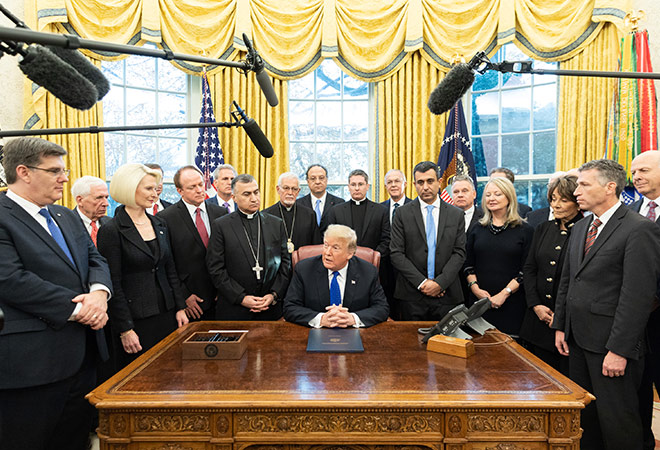-
CENTRES
Progammes & Centres
Location

The Trump administration’s recent decisions to withdraw US troops from Syria, have once again sparked a debate on the United States’ role in the world. In a series of recent tweets, President Donald Trump hailed his decision to withdraw US troops and questioned the rationale for the US fighting counter-terrorism operations abroad. Trump deemed the United States to have received “NOTHING but spending precious lives and trillions of dollars protecting others who, in almost all cases, do not appreciate what we are doing?”
Predictably, most American lawmakers, media, and academia gasped over Trump’s decision undercutting American commitments towards allied Kurdish forces, ceding ground to growing Iranian influence. They warned of this decision emboldening Russian stranglehold over the region, and even that it may pave way for the resurgence of the Islamic State. Yet, a small, but prominent, group of commentators and legislators hailed Trump’s decision. For instance, noted realist scholar Stephen Walt claimed that Trump had done “the right thing”, and Republican Senator Rand Paul – known for his libertarian views – announced that he was “very proud of the President” for withdrawing from Syria.
Increasingly, calls for a more narrow conception of US interests abroad have been growing. Advocates for US retrenchment to a grand strategy of restraint often deem the United States to lack “the need, the capability, and the mandate to manage global security.” Moreover, some even argue sustaining American primacy for the longer term by husbanding resources with an offshore-balancing strategy. Stopping short of outright isolationism, such an approach dictates, “instead of policing the world, the United States would encourage other countries to take the lead in checking rising powers, intervening itself only when necessary.” Most importantly, this approach construes US global leadership as “not an end in itself”, rather it deems the same to be “desirable only insofar as it benefits the United States directly.”
In Trump’s conduct of the United States’ foreign policy, such a view holds currency – from accusing European and North American allies of treating the US “like a piggy bank to be robbed”, to announcing other countries like Turkey to take the lead in fighting the Islamic State.
In addition, in expressing deep aversion on nation-building activities abroad, senior Trump administration officials have announced that the United States will no longer pursue its “longstanding pattern of aid without effect, assistance without accountability, and relief without reform.” One may look no further than Pakistan with regards to evidence supporting that shift in policy, as the Trump administration holds back aid amounting to over $1 billion, and supports Pakistan’s grey-listing at multilateral platforms like the Financial Action Task Force. Furthermore, on husbanding resources, the Trump administration’s repeated outcry over seeking “fair” and “reciprocal deals” has even pulled into Trump’s cross-fire countries like India – notwithstanding the fact that India takes the tenth spot on the list of countries that register a deficit with the US and supposedly enjoys broad bipartisan support amongst US policymakers and national-security officials.
Further, although the transactionalism witnessed in recent American foreign policy can, in large parts, be attributed to Trump, a slow shift away from the standard pre-set for liberal internationalism has been evident in the post-Cold War world.
With continued American primacy – chiefly in the military realm, at its core, the immediate aftermath of the Cold War under President George H. W. Bush hailed the emergence of “a new world order, where brutality will go unrewarded and aggression will meet collective resistance.” Thereafter, the Bill Clinton years saw the employment of US force for a myriad range of non-combat missions – across the Balkans and Sub-Saharan Africa, under the liberal internationalist grand strategy of “enlargement” of democratic regimes mainly in the areas of the former Soviet Union.
This inclination towards employing the US military as the ‘tip of the spear’ towards US foreign policy interests, reached its peak under the subsequent George W. Bush years. Armed by a neoconservative outlook and American military primacy riding high in the post-9/11 fog of war, the Bush administrations pursued regime-change agendas primarily in the Middle East. Subsequently, an American standing – tarnished by the Bush-era’s militarised unilateralism – fed the Obama administrations’ motivation behind ‘leading from behind’, encouraging burden-sharing, cobbling multilateral coalitions across varied realms of nuclear non-proliferation, combating terrorist safe-havens, and even humanitarian interventions.
Finally, the trend away from liberal internationalism seems to have reached its farthest point on non-intervention and minimal US stewardship with the Trump presidency. By April 2016, support for American activism abroad had dwindled. According to a poll, about 57 percent of Americans agreed that the United States should “deal with its own problems and let others deal with theirs the best they can.”
In the near-future, charged by nationalist overtones of a renewed conservative movement, the ‘America First’ outlook may just usher in the last mile towards offshore-balancing.
Many see the shuttering of The Weekly Standard – run by noted neoconservative commentator Bill Kirstol, as an ominous sign of the shift away from the Reagan era conservatism of touting the United States’ perceived stature as the “shining city upon a hill”. Moreover, commentators have even noted Trump’s conservative nationalism of ‘America First' to have forced the marginalised liberal internationalists and Bush-era neoconservatives to find common ground despite their divergences over employment of force and multilateralism.
Further, increasingly younger American generations seem to have a greater preference for a less global America, as revealed by a recent Pew Research polls. One poll found younger Americans (under 30) to be generally less likely to prioritise limiting power and influence of foreign powers like Russia, and China – only three-in-ten young people concurred, while 54 percent (65 or older) argued for the US to actively engage in limiting the influence of Russia. Another poll found a substantial age divide in the priority given to maintaining US military primacy – 64 percent older Americans concurring vs. 30 percent younger Americans. Reduction of American military commitments abroad drew support of 34 percent younger Americans vs. 20 percent older Americans. On combatting terrorism as well, younger generations seemed to support less US military activism. When asked if the US should actively take measures towards seeking and destroying terror groups in other countries, only 27 percent of Americans under 50 deemed it as a top priority compared to 44 percent of those 50 and older.
Thus, future generations’ preferences against US activism abroad compounded by the rise of Trumpian conservative nationalism, seems poised to challenge the post-Cold War dominance of liberal internationalism in American strategic culture.
The views expressed above belong to the author(s). ORF research and analyses now available on Telegram! Click here to access our curated content — blogs, longforms and interviews.

Kashish Parpiani is Senior Manager (Chairman’s Office), Reliance Industries Limited (RIL). He is a former Fellow, ORF, Mumbai. ...
Read More +